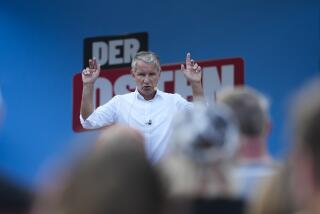Schools Face Up to the New Europe : Academia: Textbooks were outdated overnight because of German reunification. Professors resort to articles in periodicals.
- Share via
AMHERST, Mass. — Last year, political science professor Karl Ryavec tossed aside his textbooks on East Germany.
“They’re all history now,” he says.
Members of the GDR Studies Assn. are voting by mail on whether they should disband, said Henry Krisch, who was elected president of the group the day before Erich Honecker, the hard-line Communist leader of the German Democratic Republic, was overthrown.
“On the one hand, I’m sort of like the last captain of the Titanic, but on the other hand, I’ve outlasted Honecker,” Krisch said.
He and his colleagues in the field still face the question: Now that the Berlin Wall and much of what it stood for has tumbled, what’s an East German scholar to do?
“What you’re having, of course, is a rebirth with a vengeance,” said Melvin Croan, political science professor at the University of Wisconsin at Madison who specialized in East Germany.
At the University of Massachusetts, Ryavec has been relying on something a little more current than the usual texts.
“It’s like being a first-year teacher again, in that you have to write new lectures and all the coverage of institutions in terms of what institutions are important and who’s on them and what they do. All that is now history,” he said.
“You tell the students not to take what you read as presently applicable, but you use the textbooks as background. Then you find articles, including newspaper articles, and you copy them and hand them out. You tell them to watch TV and listen to the radio and read the papers.”
Croan is optimistic. He noted that experts on East Germany are few and that all of them have other areas of expertise. And there still is a need for people to explain the transformed GDR.
“The new Germany is just kind of grist for my mill,” he said.
Ryavec is a Sovietologist who also teaches on East Central Europe. Thus his main field of study still is intact, although it, too, has changed drastically.
“You wonder whether you’re flexible or not,” he said. “We’re all very much up in the air. We’re waiting for something like a new normalcy to appear. We’re waiting for these countries to settle down.”
“In terms of teaching, you have a situation which is a very fluid one,” said Adam Ulam, who directs Harvard University’s Russian Research Center.
Textbook publishers are doing their best to get all the changes into writing.
“One has one’s authors write the books as fast as they can and make them up to date on the day on which they deliver the manuscript,” said Frederick Praeger, publisher at Westview Press in Boulder, Colo.
“East Germany has become irrelevant in the textbook business, and it is also quite irrelevant--with the exception of the historical phenomena--in terms of general books,” Praeger said.
The reunification of Germany meant some lost revenue in 2-year-old books that might have been useful for several years with just a few changes.
“It is frustrating, yes,” Praeger said, “but we are glad that the things have happened.”
Below college level, texts are even slower to change, said Eileen Peters, a spokeswoman for Scott Foreman & Co.’s international division.
“There is no way that a high school or elementary school can switch books as fast as history is switching,” she said.
Krisch, a political science professor at the University of Connecticut, said there still is work to be done, although he won’t be plying his old trade of interpreting the shadowy world of East German politics, figuring out who was on top in the political arena.
Even as East Germany passes into history, “there are lots of important academic questions that can be answered by studying what used to be East Germany--ranging from what was it really like, now that we can look, so to speak, behind the scenes, to why did it fall apart, and even what will be the impact of this,” he said.
Croan, also a member, said he favors keeping the group going.
“I feel the special purpose of this association and other associations should be to try to salvage as much material as possible,” he said.
Krisch said he plans to wait a few months and then decide how to proceed.
So far, response has been mostly in favor of keeping the 7-year-old organization, said Krisch, who noted that an important function of the association is maintaining contacts with the former country.
“Those writers are all alive. Those filmmakers didn’t all die the day of unification,” he said.
The situation has its amusing side, Krisch noted.
“Back when it wasn’t clear . . . people were referring to the GDR as the Gradually Disappearing Republic,” he said.
Croan said he wasn’t too dismayed at having to clip journal articles to help explain the upheavals of the Warsaw Pact.
“That makes teaching fun,” he said.
More to Read
Sign up for Essential California
The most important California stories and recommendations in your inbox every morning.
You may occasionally receive promotional content from the Los Angeles Times.













